
As I began working through these films I had only seen the second one. I hadn't actually seen the first one at all. The poster was like a lot of posters at the time and while there appear to be some who think that "Scream" was rescuing the horror genre, it led to an awful lot of horror movie posters showcasing 'hot' young actors all lined up. One look at the original "Final Destination" poster had me convinced that I would never want to see it any more than I wanted to see "I Know What You Did Last Summer" or the "House on Haunted Hill" remake. During this era a bunch of trendy attractive kids lined up on the video box cover was bad news and if I hadn't recognised Robert Rodriguez' name I might never have watched and loved "The Faculty".



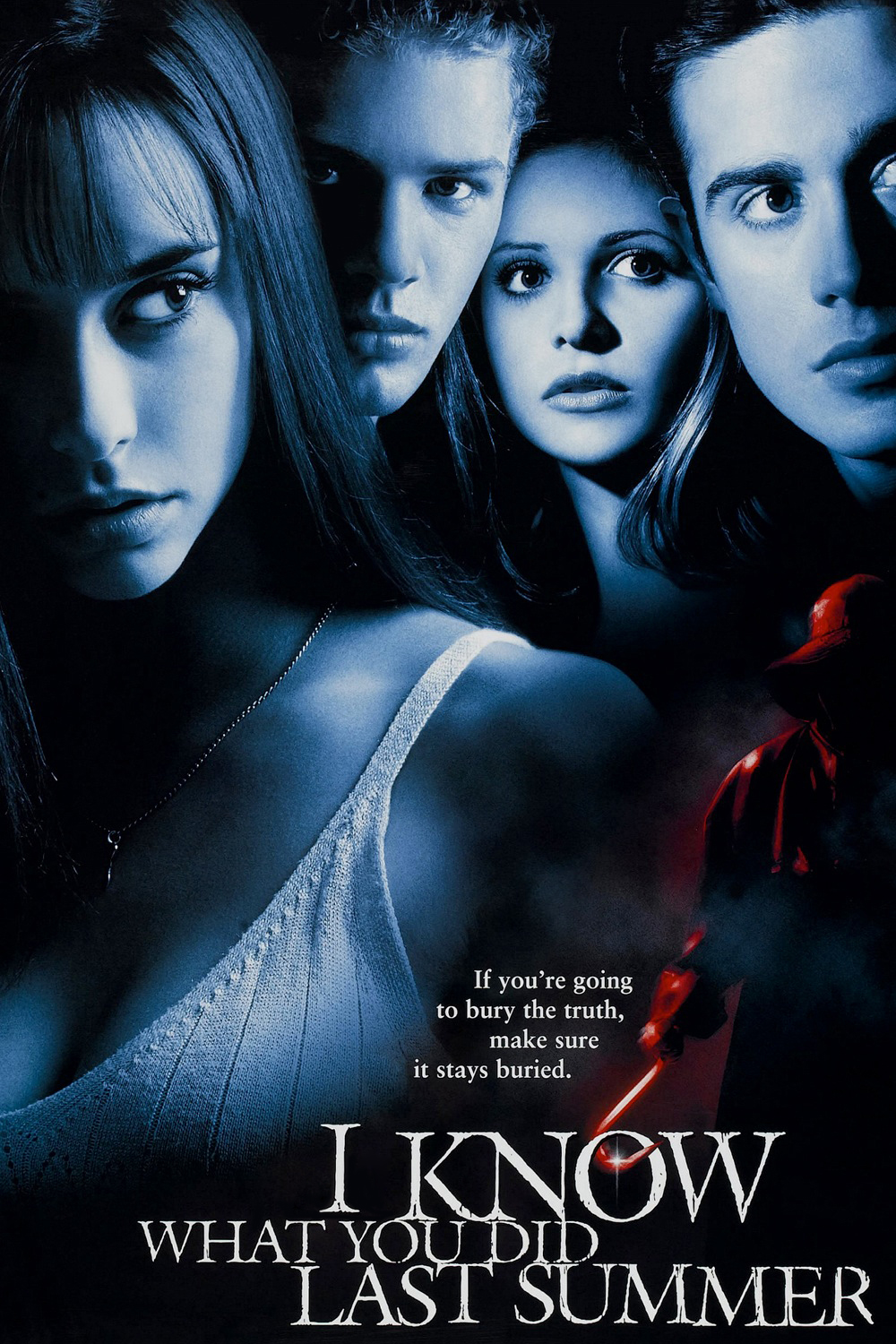
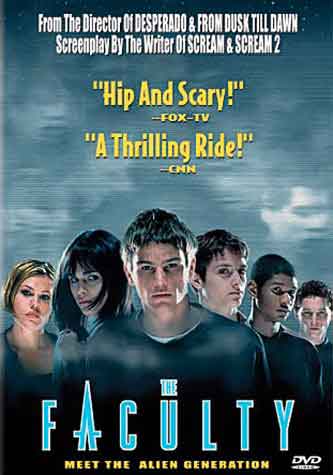
My general rule of thumb back when these came out? If it has a line of pretty young teenagers on the cover... don't bother.
I think it was only when studios were releasing the third Final Destination film that I actually came to understand what the purpose of the films actually was and finally checked out the second movie when it was on tv. I thought "Final Destination 2" was trashy but fun, but having heard that the films were only going downhill I was disinclined to check out the fourth movie terribly quickly. For one, I had already missed movie three and also making 3D a big selling point was a complete turnoff for me.
But the central premise intrigued me in these movies. Not the psychic stuff. (Seriously, when I heard that this film was about psychic visions I thought it sounded unbelieveably stupid.) Rather the idea that little coincidences could line up to lead to your death. I think the concept might have its origins with the "Omen" movies. Damien the Antichrist rarely actually confronts people in order to kill them in those movies. Often they'll be visited by some kind of animal, but in many cases the power of Satan just seemed to work through simple coincidences. Weird unexplainable accidents would serve to finish off characters. It's a really interesting idea that death is potentially everywhere you look and that ordinary events from getting in a lift, to walking down stairs, to simply enjoying your dinner all have the potential to be life-threatening activities.
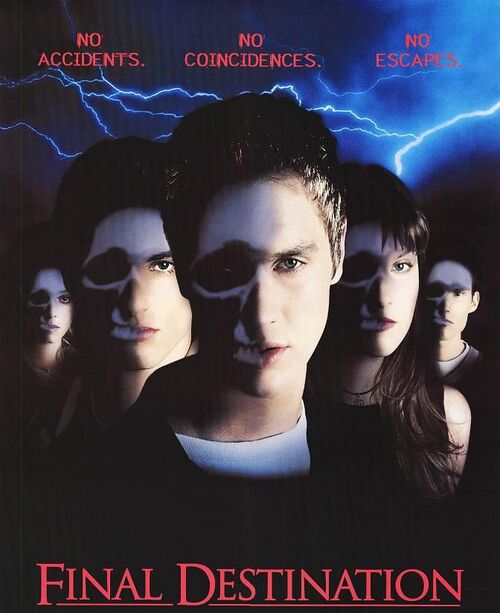
Final Destination (2000)
The first movie in the series isn't expecting you to know what is coming and it takes its time setting things up. It hints and nods to what might possibly be on the way, but in the most bizarre way. There's an opening credits scene which focusses on a fan turning from side to side blowing into the room, while in the room there's reference to um... the black plague? Seriously, I have no idea what the opening scene is trying to suggest, but simply that it's way too long and boring as hell.
Then we move to our initial setting on an airport. There's some very heavy-handed dialogue about coincidence and fate. The major familiar face in this movie at the time would have been Seann William Scott, the actor known most for his role as Stifler in the American Pie films (and yet another reason why I really was not at all interested in this film). He's an okay actor and thankfully he's not doing the obnoxious sarcastic dickhead routine from "American Pie", but he's given very little to work with here. Or at least, he provides little evidence that he has much to offer outside of that irritating role.
There's also Ali Larter, who is now known for her role in the tv series "Heroes" as well as the role of Claire in "Resident Evil:Extinction". However, at this stage pretty much all she was known for was the remake of "House On Haunted Hill" (yet another horror-movie with Scream-style 'hot' young actors lined up video box cover). I have tough time enjoying her performance in this first film, but I think it was probably her performance in the second movie, with her character having been hardened by the events of the first film, which made me want to check out this series in the first place.
The basic premise of all Final Destination movies is technically a spoiler though it happens in the first 15 minutes of each film. If you are really keen to avoid hearing it you may as well stop reading these reviews entirely right now since it will be repeated several times...

The basic premise of all Final Destination movies is that certain people have a sort of 'psychic' ability to see 'death's design' ahead of time and to make changes to it. By this, I mean that everyone is destined to die, but sometimes someone can see ahead exactly how everyone is supposed to die and then help them avoid their fate. In this first movie a select group of school children avoid their fate when they make a fuss and get themselves thrown off a plane which one child has forseen will blow up. Initially it doesn't seem like a vision at all though. Instead it seems like he is on the plane and the plane is coming apart at the seams with him inside. At the point where the catastrophe affects him personally he 'wakes up' to discover that the accident hasn't happened... yet, but events are repeating themselves and it's only a matter of time.
The early sequence involving the plane coming apart might have been really impressive, if I hadn't already seen it done better. That might seem unfair, after all this film came out in 2000. But the film where I've seen it done better came out the year before. I am, of course, talking about David Fincher's last decent film, "Fight Club" (yes, I am being horribly opinionated with that throwaway remark, I know). It might even be argued that "Fight Club" provided the entire inspiration for this initial scene. The side of the plane comes apart and entire aisles get sucked out by the vacuum and Edward Norton's character wakes up to reveal to us that it has all been his own self-destructive fantasy. But here in "Final Destination", it was not a fantasy, but rather a vision of the future.
Having left the plane, the teenagers watch as it leaves and explodes. They are traumatised by this event, watching the death of their fellow students. No one is quite sure what to think about Alex, the one child who knew the event would happen before it did. The police are a little suspicious too.
Eventually we start seeing deaths happen and the exposition is a little unconvincing. Apparently the order of deaths forms the same pattern as the malfunction in a computer chip on the plane. It seems this film requires us to buy into ridiculous coincidental conspiracy theory nonsense. The premise would simplify itself a great deal in the sequel, but here it is more about psychics than it is about the power of death, so we just have to grin and bear it when psychic powers are entertained to stupid degrees.
Another aspect of this first movie ditched in the second is that death is allowed to cheat here. What we have here is a classic example of my "ghosts can do anything criticism" except that this isn't even supposed to be a movie about ghosts. Death's method of killing its first victim here (reclaiming the life that was spared from the airplane failure) is to make water leak out of a pipe so that the individual strangles himself on a shower curtain. This death doesn't look entirely convincing, but that's not the big problem. The problem is that after the strangulation has taken place, the water flows back into the leaky pipe and the pipe seals itself up. In later movies that would seem like a complete cheat and a betrayal of the central premise, but here the rules have not yet been set. What's more, it seems that death is trying to deliberately set things up so that the police will think Alex was responsible. Now that's actually much more acceptable. If there's one consistent thread through these films it seems to be that death wants to mess with his victims.
I won't spoil the various deaths in the film, but I will note that computer monitors do not EXPLODE when water is spilt on them. That is silly!
The best deaths in the Final Destination series are the ones with small intricate details, but they haven't realised that yet in the first movie. The finale gets way over-the-top and not in an intricate way, but just in a "look how easy it would be to get killed!" way. But of course, the reason why this series is so effective is because it often kills people in ordinary everyday scenarios. If things get too over-the-top then we start remembering that at any time death could just strike them with lightning and get it all over with.
I appreciate this film for setting up the "Final Destination" concept, but it's by far the least impressive of the actual "Final Destination" movies (even if not actually the worst). In spite of its reputation, I actually think I was right to dismiss it at the time. It's not awful, but every other movie in the series does more with the premise than this.
C-
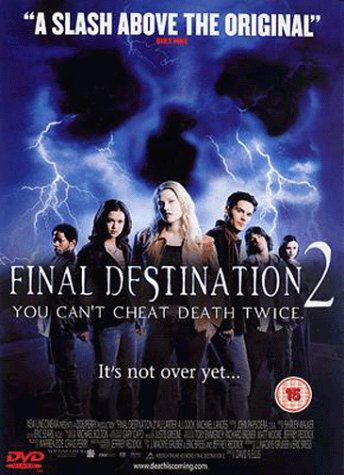
Final Destination 2 (2003)
The director of the first movie, James Wong, did not come back for this first sequel. Clearly he thought he'd done everything with the series he wanted to, at this stage at least.
Final Destination 2 is directed by David R. Ellis who is mainly known for action. As a result he does incredible work with the initial catastrophe which sets the story in motion. What is clear straight away here is that psychic are not being portrayed as a common phenomena. They are not people who have spent their whole life getting 'emphatic signals'. There's no indication that someone at a psychic fair or a Las Vegas show is going to act as their mentor. They cannot read mind or sense auras. Any indication that being psychic has some kind of significance by itself has gone by this sequel.

In this movie all being psychic means is that you get these visions out of nowhere. The only benefit of that is that you know in advance what to do to avoid dying. And even then, death is still going to just try to make sure you die some other way.
Even though it looks like we are working with an entirely fresh cast this time around a character from the previous movie does show up. By that of course I mean a victim. Tony Todd is also back with his deep voice of doom to know way too much about why things are happening. And eventually all the characters are given a connection to the previous instalment.
While Tony Todd appears in several of the films, the victims are generally brand new. Final Destination 2 has the most continuity with previous instalments out of all the sequels.
This film is often pretty silly, the acting doesn't exactly blow you away and the 'solution' at the end doesn't work that well. But the various sequences are so well-presented and so much fun that I must say that I have LOT of affection for this film.
B+

Final Destination 3 (2006)
It has been pointed out to me that that the psychic technically should have prevented the whole disaster this time around. In the intricate death sequence at the beginning (all the movies have one), which really wasn't as thrilling as it wants you to think it is, appears to be mainly the result of a character's handheld video camera. That character is one of those that are rescued, he brings the camera with him, therefore the whole catastrophe should have been entirely averted. There should have been been rather more survivors for death to pursue this time around rather than the small group numbering less than ten that we actually have here. But anyway...
After his hiatus, James Wong returns to direct this third movie. This time there is absolutely no continuity with previous movies at all and technically even Tony Todd isn't here either. They make use of his awesome deep voice, but he doesn't actually appear in the flesh anywhere in the film. Instead we have a whole bunch of new victims and a new psychic randomly selected for a vision that will appear out of the blue to mess with death's design, only for death to rush in to correct the mistake with a load of coincidental 'accidents'.
This time instead of using subtle clues about where the next death will be all around the victims, instead the clues are all found in a set of photos taken before the initial catastrophe. It's an interesting idea I suppose, but it feels a bit like the camera is supposed to be magic and that made it harder to suspend belief.
Mary Elizabeth Winstead acts pretty well here, gasping in shock and mourning her fellow students. We get much more of an emotional performance than we did in the last film. There's a much clearer indication that she is mourning the loss of her friends and feeling emotionally conflicted, rather than simply piecing together a puzzle. Unfortunately, the script is dreadful. She keeps delivering lines about her being a 'control freak' and while her delivery of the material is just fine, she's never given anything to actually do which would indicate that she was a control freak in any way. It's something we're expected to just take for granted because she keeps saying it, which just feels bizarre.

The cast in general is actually pretty good here. Asides from the lead actress, pretty much every actor in the film appears to be Canadian. I probably wouldn't have noticed this had I not recognised two actors from the awesome Canadian werewolf movie "Ginger Snaps". (If you haven't seen "Ginger Snaps" yet, check it out. It's way better than any of these.) Jesse Moss and Kris Lemche both turn up here and both play major parts in "Ginger Snaps". Jesse Moss is also in "Tucker and Dale Vs Evil" (a fantastic horror comedy, which is also better than any of these Final Destination movies) along with a number of other of these cast members.
The one actor who I think, bad script or not, was no damn good, was Sam Easton. He's a misogynistic character who is supposed to be acting as comic relief, but he ended up just being horrendously irritating. Perhaps he is better elsewhere. Perhaps its just an unsalvageable script, but I the movie would have lost nothing by leaving him out entirely.
The most well-recognised death sequence in this movie and perhaps one of the most renowned of the entire movie series is the one that takes place in the tanning salon. Annoyingly, the director didn't seem to want to play it out in one go, continuously cutting away to what other people are doing elsewhere. I know we needed a sense of the time involved, but continuously cutting away took away the tension quite a bit.
Another issue with this film is that there isn't the same intricate build-up. Sometimes the coincidences involved in the deaths are quite well-planned, but there are not many times where we are really teased, thinking to ourselves all the possible ways things COULD go wrong.
By the end I also have no idea what Kris Lemche's motivations are all about. So as much as the lead actress is selling the emotional side of this story, the actual way things unfold is generally unconvincing.
I felt like this had a lot of promise and the potential to be a much better film, but there's also some goofiness, particularly from Sam Easton, that brings it down too.
C+

The Final Destination (2009)
Somehow the choice to make 3D a big selling point for this one seems to lead to some rather cheesy CG effects. There's no magic camera this time. Instead we are back to visions. We have a number of cryptic and rather awkward to decipher imagery using some fairly naff CG effects. But what really matters here are the death sequences.
David R. Ellis returns to direct this one which means that the death sequences are now more interesting and there's a lot more teasing about what might cause the next death. We also get into the action a lot quicker. David R. Ellis doesn't really spend so much time on the emotional element, preferring to focus on the spectacle. Yet he also has a better idea of what tone to give to the action sequences too.
One particular character in "The Final Destination" is a white supremacist racist guy. We all KNOW that he's going to die. (Heck, we know that most, if not all, these characters are doomed.) But the WAY that he is dispatched has me laughing out loud, just as the director intended.
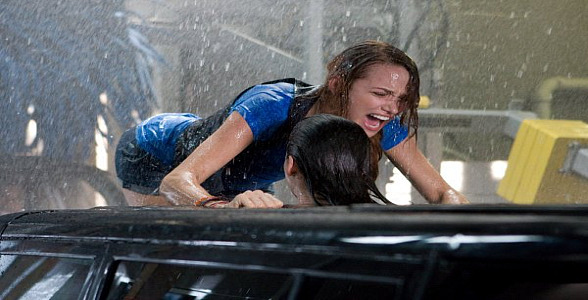
I haven't really found any of these films do much to make things creepy. Not even the first one, in spite of what some might have wanted me to believe. So I am pleased to see this film fully embracing over-the-top death scenes which are comedically gory rather than worrying too much about scaring me. The filmmakers know full well that I was barely taking this premise seriously after one movie, so by the fourth movie there's no point trying to suddenly worry about atmosphere.
"The Final Destination" isn't acted brilliantly, isn't written brilliantly, has some dodgy CG effects in places and doesn't regain the semblance of a horror atmosphere we sort of still had in part 2 (though technically we haven't really had much of that since the beginning). However, it is endlessly entertaining. All the fun of the second movie is back with a vengeance and there are parts which had me in hysterics.
The final act went a little far, particularly when the protagonist appears to have to deal with the most stubborn sprinkler system ever. (Look, if an actual fire doesn't set it off, what is your lighter supposed to achieve?) But even so, overall this was a LOT of fun and while it's incredibly silly, I would actually still highly recommend it - so long as you approach it in the right mood.
B-
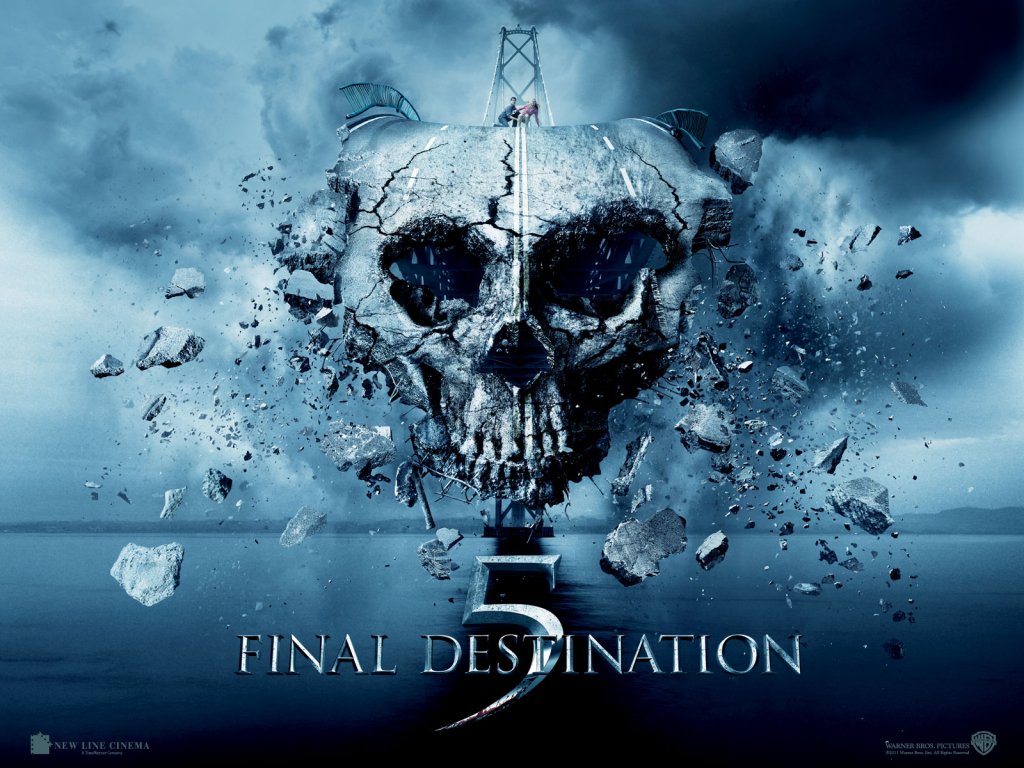
Final Destination 5 (2011)
Finally we have a film from a new director. You wouldn't know it though. The problem with Final Destination 5 is that it tries to combine elements from both director's styles and ends up being a poor imitation of both.
The opening death sequence this time takes place on a bridge. It's pretty visually spectacular, but some elements are thrilling, but others are less so and the whole thing feels boring before the end. The sequence seems to lack Ellis' flair for action direction, yet the new director wants to spend a similar length of time on it.
We have a series of characters and we have some sense that they are traumatised by what has happened to them, but they never really feel terribly fleshed out. It's not until the final act of the film that the film finally decided to do something interesting with the characters and built something new into the mythology, which I'll try to address in a non-spoilery way below.
The death scenes try to be both horrific and comedic at the same time and the result is that the tension is poorly handled AND the comedy is badly timed. So often we actually get the worst of both worlds here. There are a few points where I thought I was going to be teased about how the death could take place, but in most cases this doesn't really work very well. The one exception being early on with the athletics display sequence. It's very intricate and very well-handled, but I get the feeling like it drained all imagination out of the other scenes. The scene where I was most on edge was the laser eye surgery scene, but it ended up being way too straightforward and, to be frank, more than a little anticlimactic.
Two main strengths of this film are, first of all, the return of Tony Todd. He's the creepy mortician again and unlike in the second film, we don't need an existing character to get the characters to consult him. Also, unlike in the first film, the characters don't just sneak into the mortuary for absolutely no reason at all. The method for introducing him is kind of genius actually. Where do you find a mortician? Funerals and when the body is collected from a crime scene. When they keep seeing Tony Todd turn up, our protagonists/victims are unsurprisingly suspicious particularly when he keeps making comments about "death's plan".

The other major strength of this film is the ending. Now a bad ending can ruin a good film, but I'm not convinced that a good ending can save a bad one. However, the final act admittedly does bring in some new mythology to the series, which was sorely needed. It also ties into the old films, providing some continuity. After the last two films contained an entirely new and completely unrelated set of characters, some connection between these new characters and what has come before was good to see. Unfortunately bringing all these elements in at the last minute was just too little too late. Which is probably the best way to describe this film as a whole.
"The Final Destination" went over-the-top in order to finish the series with a bang. "Final Destination 5" (or "5inal Destination" as it was nearly called. True story!) tried to bring the series back from the brink and keep the sequels rolling out. I think it failed and I'm not very pleased to have to say that.
D+